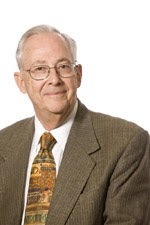
Dr. David B. Gracy Faculty Profile photo
The Society of Southwest Archivists has lost a powerful advocate for archives. Dr. David B. Gracy II died peacefully in his home in the early morning of Saturday, September 26.
Dr. Gracy was many things to many people: an archives evangelist, a mentor, a teacher, a colleague, even a train conductor at times.
Last year, at the Society of American Archivists annual meeting, Dr. Gracy gave a presentation and recorded an interview.
The presentation he gave at SAA 2019, “Archival Perspectives – From Texas And Beyond” is, unfortunately only available to current SAA members.
If you aren’t a current SAA member, he was also interviewed that same week on the podcast “An Archivist’s Tale.”
Both recordings are filled with Dr. Gracy’s energy and signature quips. Hot Dog!
If you have access to JSTOR, there is an entire journal volume of Information & Culture devoted to Dr. Gracy’s career.
We encourage you to leave a remembrance wherever you feel comfortable, be it through his obituary website, SAA’s website, through social media, through an e-mail to a colleague, or just privately with a short moment of silence.
And should you feel inclined, you can pay tribute to Dr. Gracy by contributing to the student scholarship named for him.
Into the breach!